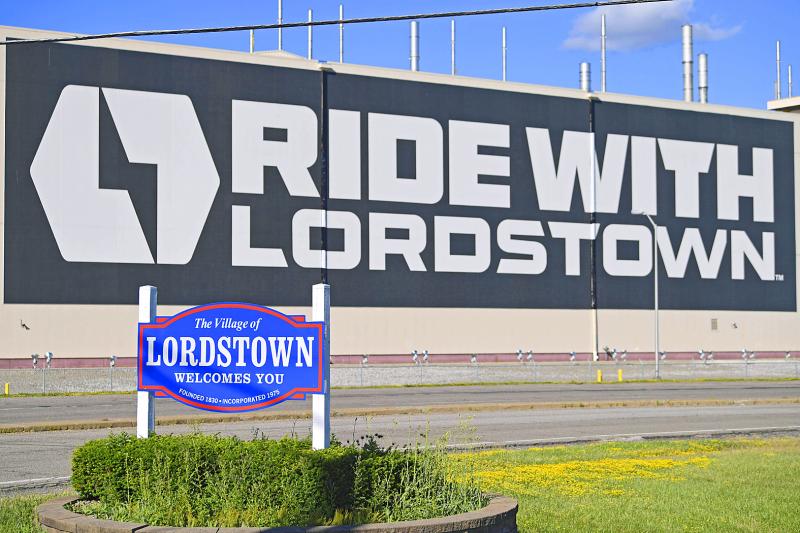Foxconn Technology Group’s (富士康科技集團) planned purchase of embattled start-up Lordstown Motors Corp’s auto plant in Ohio might make it a stronger contender to assemble electric vehicles for Apple Inc, but success with the endeavor is far from guaranteed.
The Taiwanese company is the largest maker of iPhones, giving it a potential edge as Apple explores the automotive sector.
Foxconn agreed to spend US$280 million on the Lordstown deal, one of the top vehicle-related investments it has made over the past two years.

Photo: AP
Foxconn’s early moves into electric vehicles have yielded few tangible results and Apple is expected to require solid proof of vehicle-manufacturing expertise before it settles on a partner — if the iPhone maker decides to make the leap into autos at all.
Shares of Hon Hai Precision Industry Co (鴻海精密), as Foxconn is known in Taiwan, fell in Taipei trading yesterday in a sign of investor doubt the plant purchase would be a game changer for the electronics giant.
“It is only logical for Foxconn to explore vehicle manufacturing to stay relevant,” said Steve Man, an automotive analyst at Bloomberg Intelligence in Hong Kong. “If you look at the upstream companies in its value chain, many are dabbling in electric, smart vehicles. Cars are becoming the next mobile devices.”
While Foxconn has inked several electric-vehicle partnerships, its investment in the business has been relatively modest and far behind that by auto giants such as Volkswagen AG or Hyundai Motor Co.
Scoring a deal with Apple would vault Foxconn into a major player in the rapidly growing segment, which it is targeting as a source of growth beyond low-margin electronics.
Apple, which is not expected to enter the market for several years, but is kooking into it, would be the ultimate prize for every aspiring electric vehicle manufacturer.
Working in Foxconn’s favor is its strong relationship with the US firm. The years-long partnership has expanded as Apple has added product categories and the company now accounts for about 50 percent of Foxconn’s annual sales.
Any Apple automobile is still years away and the company has suffered setbacks, including the departure of the head of its electric vehicle project to Ford Motor Co.
An Apple electric vehicle has for years been somewhat of a paradox — it is one of its most hotly anticipated products, yet the company has publicly said almost nothing about it.
Analysts at CL Securities Taiwan said in a note that the plant purchase is cheaper and quicker than building capacity from scratch, which “should help alleviate some investors’ concerns on the visibility for EV [electric vehicle] earnings contribution.”
Foxconn has yet to commercially release any vehicle following the debut of its electric vehicle platform last year.
It plans to start mass production of Lordstown’s Endurance electric pickup truck in Ohio in April next year, a person familiar with its schedule said.
The Lordstown deal “reflects Foxconn’s flexibility in providing design and production services for different EV customers,” Hon Hai chairman Young Liu (劉揚偉) said in a statement yesterday.

Shiina Ito has had fewer Chinese customers at her Tokyo jewelry shop since Beijing issued a travel warning in the wake of a diplomatic spat, but she said she was not concerned. A souring of Tokyo-Beijing relations this month, following remarks by Japanese Prime Minister Sanae Takaichi about Taiwan, has fueled concerns about the impact on the ritzy boutiques, noodle joints and hotels where holidaymakers spend their cash. However, businesses in Tokyo largely shrugged off any anxiety. “Since there are fewer Chinese customers, it’s become a bit easier for Japanese shoppers to visit, so our sales haven’t really dropped,” Ito

The number of Taiwanese working in the US rose to a record high of 137,000 last year, driven largely by Taiwan Semiconductor Manufacturing Co’s (TSMC, 台積電) rapid overseas expansion, according to government data released yesterday. A total of 666,000 Taiwanese nationals were employed abroad last year, an increase of 45,000 from 2023 and the highest level since the COVID-19 pandemic, data from the Directorate-General of Budget, Accounting and Statistics (DGBAS) showed. Overseas employment had steadily increased between 2009 and 2019, peaking at 739,000, before plunging to 319,000 in 2021 amid US-China trade tensions, global supply chain shifts, reshoring by Taiwanese companies and

Taiwan Semiconductor Manufacturing Co (TSMC, 台積電) received about NT$147 billion (US$4.71 billion) in subsidies from the US, Japanese, German and Chinese governments over the past two years for its global expansion. Financial data compiled by the world’s largest contract chipmaker showed the company secured NT$4.77 billion in subsidies from the governments in the third quarter, bringing the total for the first three quarters of the year to about NT$71.9 billion. Along with the NT$75.16 billion in financial aid TSMC received last year, the chipmaker obtained NT$147 billion in subsidies in almost two years, the data showed. The subsidies received by its subsidiaries —

Taiwan Semiconductor Manufacturing Co (TSMC) Chairman C.C. Wei (魏哲家) and the company’s former chairman, Mark Liu (劉德音), both received the Robert N. Noyce Award -- the semiconductor industry’s highest honor -- in San Jose, California, on Thursday (local time). Speaking at the award event, Liu, who retired last year, expressed gratitude to his wife, his dissertation advisor at the University of California, Berkeley, his supervisors at AT&T Bell Laboratories -- where he worked on optical fiber communication systems before joining TSMC, TSMC partners, and industry colleagues. Liu said that working alongside TSMC